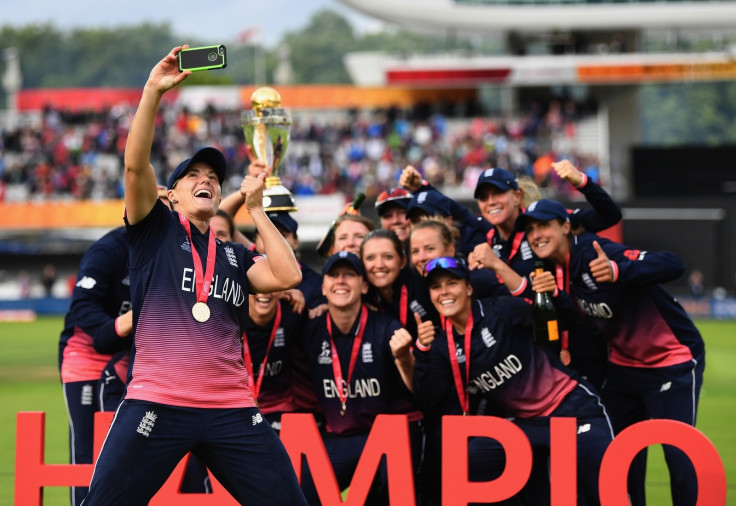British summer given refreshing glow amid fabulous female success
England's female cricket and football teams have grabbed the nation's attention.
This has been an unusual summer of sport: one where the storylines have been dominated by women for a change. A healthy change. All summer we have been talking about Jodie Taylor and Johanna Konta, Anya Shrubsole and Hannah Cockroft. We can but hope that Laura Muir and friends will dominate August.
In a year without a (men's) World Cup or a (men's) European football championships to consume the national sporting consciousness, there has been space for alternative events to thrive. That it has been women's sport has been an unexpected treat.
It was Konta's Wimbledon journey that dominated tennis talk this year rather than Andy Murray's somewhat forlorn championship defence. But the battling nature of her advance to the semi-final gripped so much more than the pseudo debate about whether she was Hungarian, Australian or British.
Nestling alongside Konta's tale was the journey of the England women's cricket team all the way to a dramatic Lord's victory to clinch the 50-over World Cup. England were the best team in the tournament – but being the best does not always guarantee glory in a sudden-death final. For much of that enthralling day at The Home Of Cricket it looked as though India would claim the trophy. But in a heart stopping denouement, Shrubsole snatched victory from the jaws of defeat. It was a fairy tale ending for a player who had visited Lord's as a ten-year-old and declared: "What a place! I'd like to play here ....for England ... in a World Cup final."
Around the country, fans were thrilled by cricket that showed itself to be every bit as entertaining and skilled as any produced by men, and England's final triumph was the inspirational icing. Those crowds too were instructive, featuring more women and children than would be found at most sporting events in this country. Compare this to American sports, where crowds are usually more family friendly, not least due to the way that events are treated as entertainment rather than just tribal battles with overwhelming atmospheres of testosterone.
Hoping to recapture some of the spirit of London 2012, the World Athletics Championships and the corresponding Paralympic event have returned to London this summer. The Para event has already played its part, with British wheelchair sprinter Cockroft leading the charge and rousing the nation. Cockroft, who was born with cerebral palsy and wasn't expected to live into adulthood, claimed three gold medals at London 2017 to go alongside the two golds she won in 2012 and a further three more in Rio.
England's women footballers fell on the edge of glory with their 3-0 semi-final defeat in the European Championships on Thursday (3 August) but not before enrapturing a nation. Personally and anecdotally there are so many stories of women with little interest in men's football who have been enthralled by England's progress through the tournament, claiming four consecutive wins before falling to the hosts. No shame in falling just short, and a great deal more impressive than the men's team's showings for the last three decades.
Furthermore. the Lionesses features a player, Toni Duggan, who is about to make a move that hasn't happened for any of their male counterparts since Gary Lineker in 1986: she has been signed by Barcelona. Another, top scorer Taylor, played in the American league, a nation where women's soccer is treated with far greater respect and drawn from a much larger player base.
Perhaps a key element of the popularity of Britain's sportswomen this summer has been their success: the women's cricket team won the one-day World Cup – something the English men have never achieved. While the England women's football team were the first from these shores to reach the semi-final of a major tournament in 27 years. Konta's semi-final was the first time a British woman reached that stage in 39 years.
In doing so they have provided inspiration to a whole gender, and, this summer at least, been given the respect that should accompany such achievement.
That so much of this sporting achievement has been played out on free-to-air television has given the moment the air to breath. Channel 4's coverage of the Women's European championships has been exemplary, and while the cricket World Cup was on Sky, some of it was made freely available, and all of it was covered by BBC Radio.
Now come the World Athletics Championships as the Olympic Stadium briefly returns to its original purpose. Among Britain's biggest medal hopes is Scottish middle distance runner Laura Muir whose career has been on a steadily upward trajectory over the last couple of years and will hope to benefit from the home crowd boost provided by a major event being held in Britain. Sophie Hitchon in the hammer and Katarina Johnson-Thompson, no longer in Jessica Ennis-Hill's shadow in the heptathlon, also have realistic medal aspirations.
But the question will be what happens after the sporting festival at the venue formerly known as the Olympic Stadium? When the Premier League returns will we all return to obsessing over male football with the women barely given a mention?
Will this summer of women's sport lead to greater things or will they take a back seat once again.The proof will possibly be in the inches and TV time given in the coming months and years. The audience is there, although whether it is healthy to be as sports obsessed as a nation as we are is another question entirely.

© Copyright IBTimes 2025. All rights reserved.






















